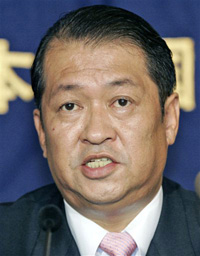Japan discloses names of three executed murderers

Japan unveils some of the secrecy that surrounds executions in this country. Three convicted murderers executed on Friday and their names were disclosed.
Seiha Fujima, 47, and Hiroki Fukawa, 42, were hanged in Tokyo, and Noboru Ikemoto, 75, in the western city of Osaka, was also put to death, the Justice Ministry said in a statement.
The ministry had previously withheld all identities of those executed. One of the few industrialized nations to retain the death penalty, Japan routinely faced criticism by human rights activists for keeping details of its executions secret.
"It was painful to sign the executions, because it meant I was taking (their) lives by using the state authority," Justice Minister Kunio Hatoyama told a parliamentary committee, where he also provided details of Friday's executions. But he defended the decision, saying the executions would contribute to restoring public safety, "soothe victims' feelings and meet the public's expectations."
Amnesty International lauded the decision to release more information about the convicts, but strongly condemned Friday's executions, which increased the country's annual total to nine.
"Executions were again carried out suddenly, without advance warning to either the convicts or their families," Amnesty said in a statement. "We hope Japan will take steps in the near future to abolish the grave offense that the death penalty is to human rights."
Until November 1998, the ministry had only provided the number of executions in annual statistics.
The Justice Ministry then began providing the number of people hanged on the day of the executions, allowing international bodies to track Japan's record, but withheld all other information, including the names of those executed, saying that to make it public would distress the inmates' families and other death row prisoners.
Friday's disclosure, which followed requests from victims' families and their supporters, also reflected the ministry's attempt to meet the public interests for greater openness and promote understanding about capital punishment, officials said.
Fujima was convicted of a murder and robbery in 1981, followed by the killings in 1982 of a 16-year-old girl, two of her family members and an accomplice that stemmed from an attempt to accost the teen, the ministry said.
Fukawa's conviction resulted from two murders and two cases of fraud connected to those murders in 1999 and 2000, while Ikemoto, 75, was convicted of three murders and one attempted murder in a dispute with a neighbor over garbage in 1985, it said.
Three convicts were executed in April, followed by another trio in August.
The Justice Ministry's latest available data show 104 more convicts remain on death row.
Subscribe to Pravda.Ru Telegram channel, Facebook, RSS!


